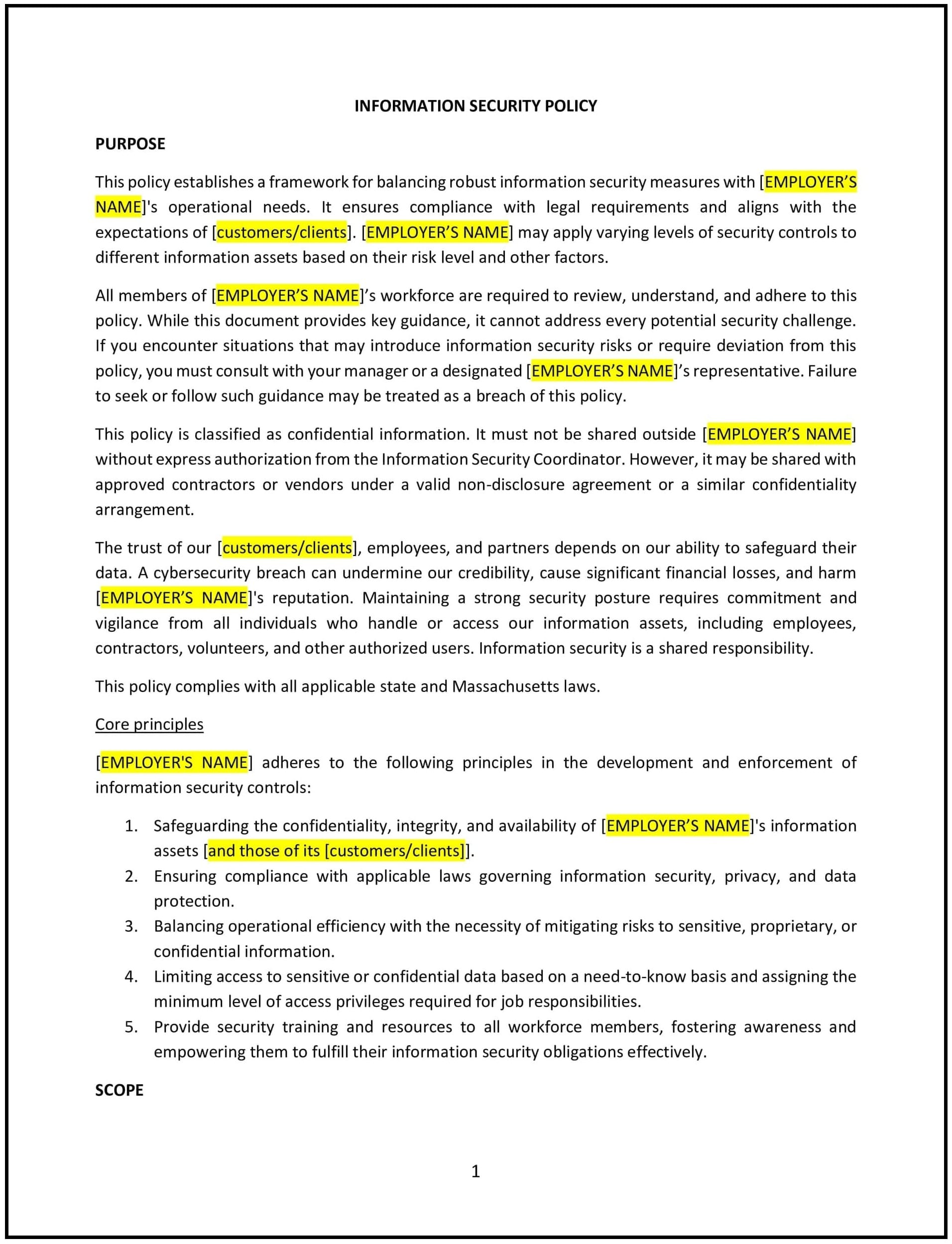Information security policy (Massachusetts): Free template
Got contracts to review? While you're here for policies, let Cobrief make contract review effortless—start your free review now.

Customize this template for free
This information security policy is designed to help Massachusetts businesses establish and maintain a secure environment for protecting sensitive data and information systems. The policy outlines the company’s approach to safeguarding data against unauthorized access, disclosure, alteration, and destruction. It defines the roles and responsibilities of employees and management in maintaining information security, as well as the procedures and best practices to follow for data protection.
By adopting this policy, businesses can ensure that they comply with Massachusetts state laws, federal regulations, and industry standards for information security, reduce the risk of data breaches, and maintain the trust of clients, customers, and stakeholders.
How to use this information security policy (Massachusetts)
- Define sensitive data and information: Clearly outline what constitutes sensitive information, including personal data, financial information, intellectual property, trade secrets, and any other data that must be protected. The policy should define the different types of data and how they should be treated based on their sensitivity level.
- Assign roles and responsibilities: Specify the roles and responsibilities of employees, contractors, and third-party vendors in protecting information security. This includes the roles of IT staff, management, and individual employees in ensuring the integrity and confidentiality of data.
- Implement access control measures: Set guidelines for limiting access to sensitive data based on job responsibilities. Employees should be granted access to only the information necessary for their roles, and access permissions should be regularly reviewed and updated.
- Provide data protection measures: Outline the technical and administrative measures in place to protect data, such as encryption, firewalls, multi-factor authentication, and secure passwords. The policy should include specific procedures for securing physical and digital assets.
- Address incident response and reporting: Define procedures for identifying, reporting, and responding to security incidents or breaches. The policy should include instructions for employees on how to report security concerns, who to contact in case of a breach, and how to respond to mitigate the impact of security incidents.
- Establish data retention and disposal guidelines: Specify how long data will be retained and the processes for securely disposing of or anonymizing data when it is no longer needed. This includes guidelines for safely deleting electronic data and physical records.
- Promote employee training and awareness: Ensure that employees are trained on information security best practices, company policies, and legal requirements related to data protection. The policy should require ongoing training to keep employees updated on emerging threats and security practices.
- Comply with Massachusetts and federal laws: Ensure that the policy complies with Massachusetts state laws, including the Massachusetts Data Security Regulations (201 CMR 17.00), and federal regulations, such as the Health Insurance Portability and Accountability Act (HIPAA) and the General Data Protection Regulation (GDPR), where applicable.
- Review and update regularly: Periodically review and update the policy to ensure it remains aligned with changing security threats, emerging technologies, and regulatory requirements.
Benefits of using this information security policy (Massachusetts)
This policy offers several benefits for Massachusetts businesses:
- Protects sensitive information: By implementing strong security measures, businesses can protect sensitive data from unauthorized access, theft, and destruction, reducing the risk of data breaches.
- Complies with legal requirements: The policy promotes compliance with Massachusetts state laws, federal regulations, and industry standards related to information security, helping businesses avoid penalties and legal liabilities.
- Enhances customer trust: A commitment to information security enhances the trust of clients, customers, and stakeholders by demonstrating that the business takes data protection seriously and prioritizes confidentiality and integrity.
- Reduces the risk of security incidents: By establishing clear guidelines and procedures, businesses can prevent security breaches and mitigate the impact of any incidents that do occur, improving the overall security posture.
- Promotes a culture of security: The policy fosters a company-wide culture of security by setting clear expectations and requiring ongoing training and awareness, ensuring that all employees understand their role in maintaining data protection.
- Protects company reputation: A robust information security policy helps safeguard the company’s reputation by preventing incidents that could damage trust or harm the company’s public image.
Tips for using this information security policy (Massachusetts)
- Communicate the policy clearly: Ensure that all employees, contractors, and vendors understand the company’s information security policy and their role in maintaining data protection. This can be done through employee handbooks, training sessions, and internal communications.
- Regularly assess security risks: Conduct regular risk assessments to identify potential security vulnerabilities and address them promptly. This may involve testing systems, conducting audits, and staying updated on emerging threats.
- Provide ongoing training: Ensure employees receive regular training on information security best practices, including recognizing phishing attempts, using strong passwords, and safeguarding personal devices. This helps keep security at the forefront of employees’ minds.
- Monitor and review security practices: Regularly monitor network security, access control measures, and data protection practices to ensure they are working effectively. Conduct periodic reviews of the policy to identify areas for improvement.
- Ensure vendor compliance: When working with third-party vendors, ensure they adhere to the same information security standards by requiring them to sign agreements or undergo audits related to data protection.
- Keep up with evolving regulations: Regularly review the policy to ensure it remains compliant with the latest data protection laws, including those specific to Massachusetts and applicable federal regulations.